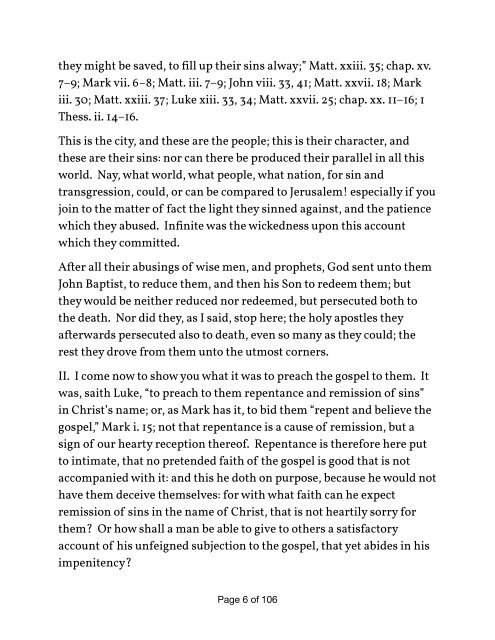The Jerusalem Sinner Saved; or Good News for the Vilest of Men by John Bunyan 1689
An encouraging book for those who feel guilty about their sins. It is a wonderful reminder that Christ's grace to his people knows no bounds and that his power to save even the worst sinner is not limited. "I have been vile myself, but I have obtained mercy; and I would have my companions in sin partake of mercy too: and therefore, I have writ this little book." Thus wrote John Bunyan about this unique gem. The premise of this book is that Jesus wanted his disciples to proclaim the gospel to the worst of sinners - those in Jerusalem who crucified their Messiah. To Bunyan's mind, this was the worst possible sin. The apostles were to begin there, with these worst of sinners, because, in Christ's eyes, they had the greatest need. Also, when they believed in Christ, his name would receive the greatest fame, and thus others would be encouraged to come to Christ. The kingdom of Satan would then be weakened, and the tempted and the weak would be helped. Further, the greatest sinners would love Christ the most when saved, and those who refused to repent would be left with no excuse. To Bunyan's way of thinking, this command to preach the gospel to "Jerusalem sinners" shows the gracious intentions of Christ toward men and his sufficiency to save the worst of sinners, and gives encouragement to those who think that their sin is too great to be forgiven.
An encouraging book for those who feel guilty about their sins. It is a wonderful reminder that Christ's grace to his people knows no bounds and that his power to save even the worst sinner is not limited.
"I have been vile myself, but I have obtained mercy; and I would have my companions in sin partake of mercy too: and therefore, I have writ this little book." Thus wrote John Bunyan about this unique gem.
The premise of this book is that Jesus wanted his disciples to proclaim the gospel to the worst of sinners - those in Jerusalem who crucified their Messiah. To Bunyan's mind, this was the worst possible sin. The apostles were to begin there, with these worst of sinners, because, in Christ's eyes, they had the greatest need. Also, when they believed in Christ, his name would receive the greatest fame, and thus others would be encouraged to come to Christ. The kingdom of Satan would then be weakened, and the tempted and the weak would be helped. Further, the greatest sinners would love Christ the most when saved, and those who refused to repent would be left with no excuse. To Bunyan's way of thinking, this command to preach the gospel to "Jerusalem sinners" shows the gracious intentions of Christ toward men and his sufficiency to save the worst of sinners, and gives encouragement to those who think that their sin is too great to be forgiven.
Create successful ePaper yourself
Turn your PDF publications into a flip-book with our unique Google optimized e-Paper software.
<strong>the</strong>y might be saved, to fill up <strong>the</strong>ir sins alway;” Matt. xxiii. 35; chap. xv.<br />
7–9; Mark vii. 6–8; Matt. iii. 7–9; <strong>John</strong> viii. 33, 41; Matt. xxvii. 18; Mark<br />
iii. 30; Matt. xxiii. 37; Luke xiii. 33, 34; Matt. xxvii. 25; chap. xx. 11–16; 1<br />
<strong>The</strong>ss. ii. 14–16.<br />
This is <strong>the</strong> city, and <strong>the</strong>se are <strong>the</strong> people; this is <strong>the</strong>ir character, and<br />
<strong>the</strong>se are <strong>the</strong>ir sins: n<strong>or</strong> can <strong>the</strong>re be produced <strong>the</strong>ir parallel in all this<br />
w<strong>or</strong>ld. Nay, what w<strong>or</strong>ld, what people, what nation, f<strong>or</strong> sin and<br />
transgression, could, <strong>or</strong> can be compared to <strong>Jerusalem</strong>! especially if you<br />
join to <strong>the</strong> matter <strong>of</strong> fact <strong>the</strong> light <strong>the</strong>y sinned against, and <strong>the</strong> patience<br />
which <strong>the</strong>y abused. Infinite was <strong>the</strong> wickedness upon this account<br />
which <strong>the</strong>y committed.<br />
After all <strong>the</strong>ir abusings <strong>of</strong> wise men, and prophets, God sent unto <strong>the</strong>m<br />
<strong>John</strong> Baptist, to reduce <strong>the</strong>m, and <strong>the</strong>n his Son to redeem <strong>the</strong>m; but<br />
<strong>the</strong>y would be nei<strong>the</strong>r reduced n<strong>or</strong> redeemed, but persecuted both to<br />
<strong>the</strong> death. N<strong>or</strong> did <strong>the</strong>y, as I said, stop here; <strong>the</strong> holy apostles <strong>the</strong>y<br />
afterwards persecuted also to death, even so many as <strong>the</strong>y could; <strong>the</strong><br />
rest <strong>the</strong>y drove from <strong>the</strong>m unto <strong>the</strong> utmost c<strong>or</strong>ners.<br />
II. I come now to show you what it was to preach <strong>the</strong> gospel to <strong>the</strong>m. It<br />
was, saith Luke, “to preach to <strong>the</strong>m repentance and remission <strong>of</strong> sins”<br />
in Christ’s name; <strong>or</strong>, as Mark has it, to bid <strong>the</strong>m “repent and believe <strong>the</strong><br />
gospel,” Mark i. 15; not that repentance is a cause <strong>of</strong> remission, but a<br />
sign <strong>of</strong> our hearty reception <strong>the</strong>re<strong>of</strong>. Repentance is <strong>the</strong>ref<strong>or</strong>e here put<br />
to intimate, that no pretended faith <strong>of</strong> <strong>the</strong> gospel is good that is not<br />
accompanied with it: and this he doth on purpose, because he would not<br />
have <strong>the</strong>m deceive <strong>the</strong>mselves: f<strong>or</strong> with what faith can he expect<br />
remission <strong>of</strong> sins in <strong>the</strong> name <strong>of</strong> Christ, that is not heartily s<strong>or</strong>ry f<strong>or</strong><br />
<strong>the</strong>m? Or how shall a man be able to give to o<strong>the</strong>rs a satisfact<strong>or</strong>y<br />
account <strong>of</strong> his unfeigned subjection to <strong>the</strong> gospel, that yet abides in his<br />
impenitency?<br />
Page<br />
6 <strong>of</strong> 106

















